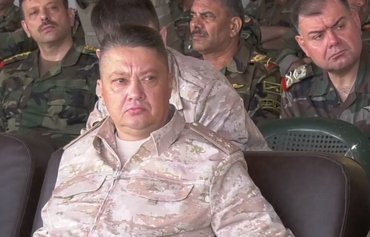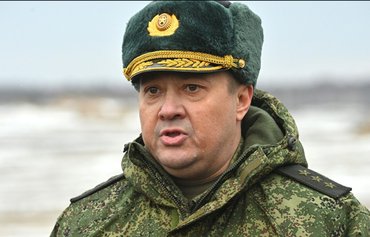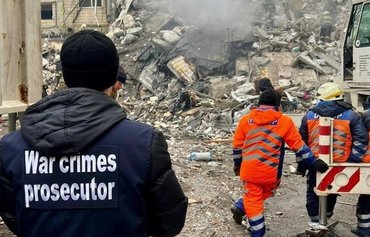Russian President Vladimir Putin's continuing relationship with disgraced Col. Gen. Aleksandr Chaiko, now the commander of Russia's forces in Syria, is the most blatant example of cronyism among Putin's ranks, say analysts.
Chaiko was sacked in October as commander of Russia's Eastern Military District amid a string of battlefield reversals in Ukraine before returning to his old position in Syria, where he had earned a global reputation for brutality.
Russia invaded Ukraine February 24 but ran into severe problems immediately.
In recent weeks, Chaiko has continued to not meet expectations, having failed to broker new agreements between Russia and the Syrian Democratic Forces (SDF) over the Turkish military operation in northern Syria.
![The body of a man, with his wrists tied behind his back, lies on a street in Bucha, Ukraine, just northwest of the capital Kyiv on April 2. [Ronaldo Schemidt/AFP]](/cnmi_am/images/2022/12/28/39974-000_327k4rc-600_384.jpg)
The body of a man, with his wrists tied behind his back, lies on a street in Bucha, Ukraine, just northwest of the capital Kyiv on April 2. [Ronaldo Schemidt/AFP]
![A member of the Syrian Civil Defence, also known as the White Helmets, carries a wounded girl following a reported Russian air strike in the village of Tal Mardikh in northwestern Idlib province, Syria, on December 19, 2019. [Omar Haj Kadour/AFP]](/cnmi_am/images/2022/12/28/39978-000_1n68wu__1_-600_384.jpg)
A member of the Syrian Civil Defence, also known as the White Helmets, carries a wounded girl following a reported Russian air strike in the village of Tal Mardikh in northwestern Idlib province, Syria, on December 19, 2019. [Omar Haj Kadour/AFP]
The Russian general has long been implicated in some of the worst atrocities in the war-ravaged country, ranging from war crimes to corruption scandals.
In June, the United Kingdom sanctioned him for his actions in Syria, and Human Rights Watch (HRW) says he may bear command responsibility for violations during the 2019-2020 Idlib offensive, including widespread attacks on hospitals and schools and the use of indiscriminate weapons in populated areas.
At least 1,600 civilians were killed and some 1.4 million were displaced during the offensive on Idlib, in northwest Syria, according to HRW.
Failed brutality
Chaiko carried out the same brutality in Ukraine but with little strategic success.
A joint investigation by the Associated Press and Frontline in October found that Russian forces moving toward the Ukrainian capital, Kyiv, had been ordered to stop and destroy "nationalist resistance", resulting in sweeping purges that ignored the laws of war.
The joint report said that these orders must have come from Chaiko.
The report added that eyewitnesses and survivors in Ozera, Babyntsi and Zdvyzhivka villages of Kyiv province -- all areas under Chaiko's command -- said Russian soldiers tortured and killed civilians on the slightest suspicion of helping the Ukrainian army.
Ukrainian prosecutors say they lack proof that Chaiko ordered specific crimes, but it is clear that atrocities were committed under his watch, the report said.
A unit under Chaiko's command -- the 76th Guards Airborne Assault Division -- is suspected of being responsible for a massacre of civilians in Bucha in March.
The atrocities did little to help Russian military efforts.
The military plans drawn up by Chaiko in the Ukrainian war led to heavy human and material losses inflicted on the Russian army, said Maj. Gen. Talaat Moussa, a military analyst.
His efforts also weakened the Russian presence on many fronts, which allowed the Ukrainian forces to advance, contrary to expectations, he said.
Chaiko attempted to implement the same plan in Ukraine that he did in Idlib province, Moussa added, "but the situation in Syria is different because of the smallness of the target area and weak military capabilities of the militias that were present in the region, compared to the Ukrainian army."
"By replicating the Idlib experience, he fell into the trap of arrogance, which yielded negative results that led to his dismissal and reassignment to Syria yet again," Moussa said.
'A pawn'
Chaiko's failures and war crimes highlight Putin's desire to have only tools loyal to him, rather than real officers who respect the rules of war, say observers.
"Putin has put himself in a tight spot because he makes decisions without referring to politically and militarily seasoned senior generals," political researcher Abdul Nabi Bakkar told Al-Mashareq.
Setbacks in Russia's invasion of Ukraine revealed that Putin has confidence only in a small group of officers who are loyal to him, Bakkar said.
Despite their failure in Ukraine, they are still his favorites, he said.
Among them is Chaiko, "whom Putin transfers from Syria to Ukraine and vice versa as if he were a pawn in a game of chess, without regard to the criticism levelled at him by officers whose field and political experience greatly exceeds Chaiko's", said Bakkar.
"Chaiko, who is involved in corruption in Syria and war crimes in both Ukraine and Syria, has turned from a first-class officer into an employee of Putin who obeys orders, whatever they may be," he added.
Many officers have begun criticising Putin and the group of officers close to him, said Bakkar, a situation reminiscent of the reign of Soviet dictator Joseph Stalin.
"It is strange that the corrupt criminal Chaiko returns to the forefront every time, as if Putin wants to deliver a message through him in response to the international sanctions imposed on him and ... on Russia because of the Ukrainian war."

![In a photo tweeted January 29, Russian Col. Gen. Aleksandr Chaiko signs a document in Belarus. Chaiko was recently reassigned to Syria after a string of battlefield reversals in the Ukraine war. [Belarusian Defence Ministry/Twitter]](/cnmi_am/images/2022/12/28/39985-chaiko-pbs-600_384.jpg)







Khloud Ali Khaled.
Reply1 Comment(s)